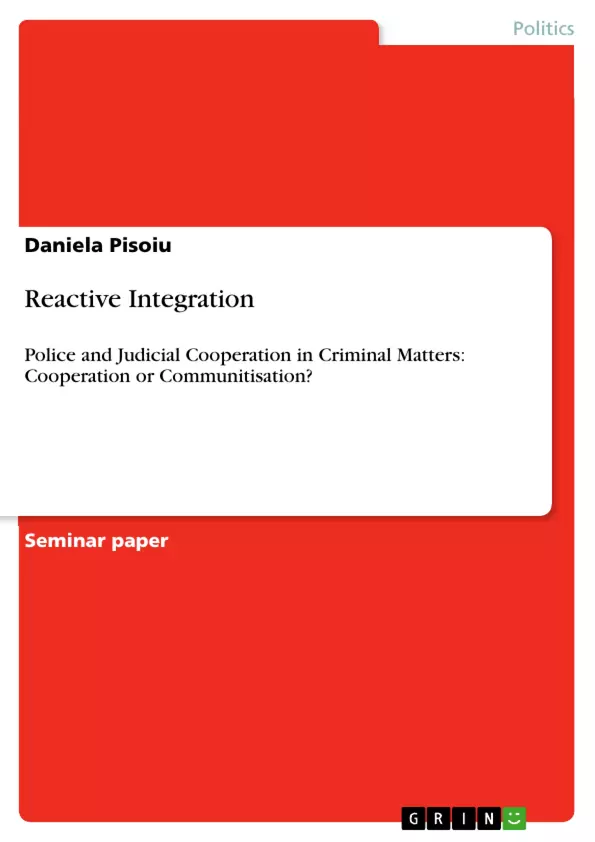European competences do not exist and develop for the sake of the European Union; the European Union exists and develops in spite of the states, as a solution of their failures, as they are forced to accept that the Union level can offer better solutions in a particular field than the national level. Cooperation in Police and Criminal Law Matters, the 3rd pillar of the Union, is still subject to intergovernmental cooperation among the Member States. The terrorist attacks in the USA and in Spain had undoubtedly a strong impact on this area, leading to a visible intensification of inter-state cooperation. This consequence is only natural, since terrorism is a crime, therefore a matter for police and judicial cooperation in criminal matters; terrorism is a global issue, affecting multiple states and therefore its combating needs the cooperation among states. Unlike on the international stage, in European Union’s case more than intensified cooperation could be possible, by way of transferring 3rd pillar matters to the supranational level of the 1st pillar.
This paper is putting forward an assessment on the likelihood of this process taking place, within the following structure: a brief overview of the way anti-terrorism measures affected the 3rd pillar, followed by an assessment of intergovernmental cooperation and communitisation as likely and recommendable for the cooperation in police and criminal matters. Finally, the “case-study” of the Framework Decision regarding the definition of terrorist offences will serve as exemplification of the arguments brought in the previous chapter.
Inhaltsverzeichnis (Table of Contents)
- I. Introduction
- II. The EU Anti-terrorism Strategy in the Third Pillar
- a) Evolution of the third pillar
- b) The 9/11 effect
- III. Cooperation or Communitisation
- a) Defining the terms
- b) More likely
- 1. The "Will of the People"
- 2. The two 11s
- c) More recommendable
- IV. The definition of terrorism
- a) The international level (UN)
- b) EU
- 1. The Framework Decision
- 2. Argumentation
Zielsetzung und Themenschwerpunkte (Objectives and Key Themes)
This paper assesses the likelihood of transferring third pillar matters (Police and Judicial Cooperation in Criminal Matters) to the supranational level of the first pillar within the EU. It examines the impact of anti-terrorism measures on the third pillar, analyzing intergovernmental cooperation and communitisation as potential approaches. The Framework Decision on the definition of terrorist offences serves as a case study.
- The impact of the 9/11 attacks and other terrorist events on EU anti-terrorism strategies.
- Comparison of intergovernmental cooperation and communitisation in the context of police and judicial cooperation.
- Analysis of the likelihood of shifting third pillar responsibilities to a supranational level.
- Examination of the European Arrest Warrant and other relevant framework decisions.
- Discussion of the definition of terrorism within the EU framework.
Zusammenfassung der Kapitel (Chapter Summaries)
I. Introduction: This chapter introduces the concept of EU cooperation in police and criminal matters, highlighting the evolution from intergovernmental cooperation to the potential for communitisation, particularly in response to terrorist events.
II. The EU Anti-terrorism Strategy in the Third Pillar: This section details the historical evolution of the third pillar (Justice and Home Affairs), emphasizing the shift from ad-hoc meetings to a more institutionalized framework. The significant impact of the 9/11 attacks on intensifying cooperation is discussed.
III. Cooperation or Communitisation: This chapter explores the definitions of intergovernmental cooperation and communitisation, assessing their respective likelihood and recommendability in the context of police and judicial cooperation. It considers arguments both for and against the communitisation approach.
IV. The definition of terrorism: This chapter examines the definition of terrorism at both the international (UN) and EU levels, focusing on the Framework Decision as a significant step towards harmonizing definitions across Member States. The chapter analyses the arguments for and against the decision.
Schlüsselwörter (Keywords)
EU anti-terrorism strategy, third pillar, intergovernmental cooperation, communitisation, police and judicial cooperation in criminal matters, European Arrest Warrant, Framework Decision, definition of terrorism, mutual recognition of judicial decisions.
Frequently Asked Questions
What does "Reactive Integration" mean in the context of the EU?
It refers to the process where the EU intensifies cooperation or transfers powers to a supranational level as a direct response to external crises, such as terrorist attacks.
How did the 9/11 attacks affect EU police and judicial cooperation?
The attacks led to a visible intensification of inter-state cooperation in the 3rd pillar and accelerated measures like the European Arrest Warrant.
What is the difference between intergovernmental cooperation and communitisation?
Intergovernmental cooperation relies on agreements between sovereign states, while communitisation moves matters to the supranational level (1st pillar), where EU institutions have more direct power.
Why is a common definition of terrorism important for the EU?
A harmonized definition (through Framework Decisions) is essential for effective judicial cooperation and the mutual recognition of court decisions across Member States.
Is communitisation of the 3rd pillar recommended?
The paper assesses the likelihood and recommendability, arguing that global issues like terrorism often require supranational solutions that national levels cannot provide as effectively.
- Citation du texte
- M.A. Daniela Pisoiu (Auteur), 2005, Reactive Integration, Munich, GRIN Verlag, https://www.grin.com/document/123192



